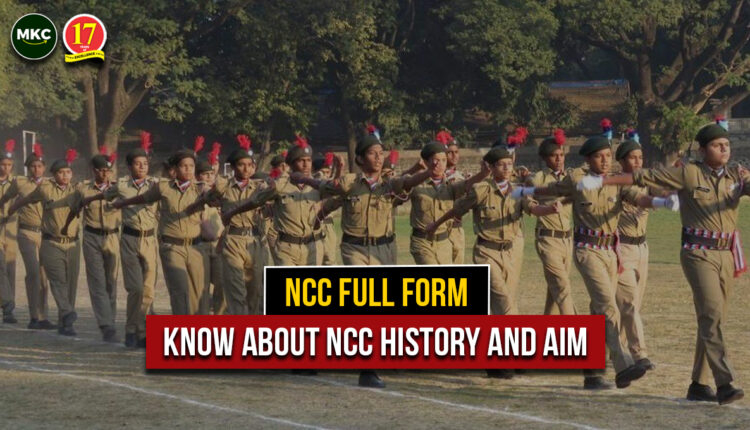NCC Full Form , Know About NCC History and Aim
NCC stands for National Cadet Corps. The National Cadet Corps is the youth wing of the Indian Armed Forces. Check out the NCC Full Form, Objectives, NCC Motto, NCC History, and Ideologies in this article.

NCC Full Form: The National Cadet Corps (NCC) is an Indian organization established in 1948 to instill values like courage, discipline, and patriotism in youth. Based in New Delhi, it welcomes students from schools, colleges, and universities across the country. NCC provides training in physical fitness, leadership, teamwork, and community service. By participating in NCC, cadets grow into individuals equipped to contribute to society and achieve personal success. The organization aims to shape responsible citizens who have a strong sense of national pride and a commitment to serving others.
NCC – NATIONAL CADET CORPS
Table of Contents
The National Cadet Corps (NCC), affiliated with the Indian Armed Forces, aims to instill discipline and patriotism among youth. Based in New Delhi, it accepts students from schools and colleges nationwide.
Cadets, representing diverse educational backgrounds, receive basic military training. Unlike officers and cadets, they are not obliged to enlist in the military after completing their training. During the conflicts of 1965 and 1971, NCC cadets played crucial supportive roles by establishing camps, conducting patrols, and aiding in the transportation of weapons and ammunition.
In emergencies, NCC cadets collaborate with civil defense officers, assisting in rescue operations and traffic management. Following the events of 1971, the NCC curriculum underwent revisions, with a greater emphasis on leadership development and reduced focus on military training.
NCC Full Form
The National Cadet Corps is the youth wing of the Indian Armed Forces with its headquarters in New Delhi, India. NCC offers military training in physical fitness, discipline, and adventure.
| Full Form of NCC | National Cadet Corps |
| NCC Motto | Unity & Discipline |
| NCC Official Website | indianncc.nic.in |
History of NCC
The NCC, the largest youth organization in the world, is regulated under the Ministry of Defence. It was formed in 1948 under the National Cadet Corps Act of 1948 and has since shaped the lives of millions of cadets. It can be considered the successor of the University Officers Training Corps, established by the British in 1942 during the wars of 1965 and 1971. The young comrades of the NCC served as the second line of Defence during those times. It was during this period that the NCC syllabus incorporated Leadership and Officer-like Qualities (OLQs) with a great emphasis, making NCC the basic building block of Indian Defence.
The NCC (National Cadet Corps) has a motto: “Unity and Discipline,” and members pledge to uphold this when they join. NCC is a non-political organization that focuses on building character and leadership skills through activities like military drills, ceremonies, adventures, and community service. In times of war, NCC cadets may be called to assist the military through an agreement between the Ministry of Defence and state governments. The NCC has played an important role in providing support to the armed forces and conducting Defence readiness training for its members.
NCC Organization
The NCC is headed by a Director General, with its headquarters located in New Delhi. It is a tri-service organization comprising the Army, Navy, and Air Force. There are a total of 17 directorates of NCC, covering the entire country. These directorates are commanded by Brigadiers or their equivalents. NCC cadets are recruited on a voluntary basis and the organization is open to every school and college student who has the spirit of camaraderie and adventure.
There are three types of certificates in NCC: A, B, and C. The most coveted one is the “C” certificate, which provides various advantages such as a fixed quota in Defence services, NCC special entry, and additional marks in several other exams.
NCC Ideologies
The National Cadet Corps (NCC) adopts the motto of ‘Unity & Discipline,’ officially adopted on 23rd December 1957. Guided by this motto, the NCC serves as a unifying force in the nation, bringing together young individuals from diverse regions of the country. It aims to mold them into cohesive, inclusive, and disciplined citizens who contribute to the strength and progress of the nation as a whole. The organization operates based on four principles:
- Obey with a smile
- Be punctual
- Work hard and without fuss
- Make no excuses and tell no lies
Three Aims of NCC
The ‘Aims’ of the NCC, laid out in 1988, have proven to be relevant and continue to fulfill the requirements of the current socio-economic landscape of the country.
- To cultivate Character, Comradeship, Discipline, Leadership, a spirit of Adventure, Secular Outlook, and Selfless Service among the youth of the nation.
- To nurture a human resource of Motivated, Organized, and Trained youth capable of providing leadership in all spheres of life.
- To foster an environment conducive for youth to join the Defence forces.
NCC fosters qualities such as brotherhood, honesty, integrity, secularism, and decision-making. The training encompasses not only physical development but also mental and spiritual growth, shaping individuals into leaders in various aspects of life. While joining NCC may not guarantee wealth, it imbues individuals with enduring values, making them more than mere material successes.








